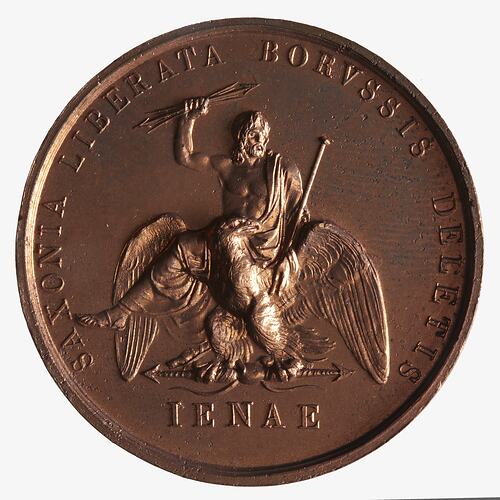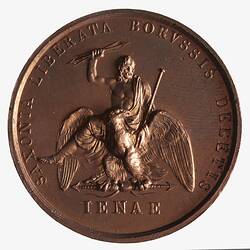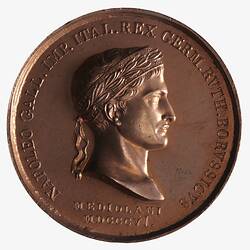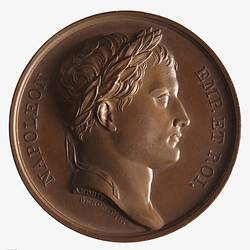Summary
Medal Bataille d'Jena, 'Battle of Jena', Issued by France, Italy, 1806
Artist: Luigi Manfredini, Milan, Italy
Minted by Milan Mint
Note: Sometimes called the Battle of Jena-Auerstedt or the twin battles of Jena and Auerstädt
Obverse Description
Bust of Napoleon wearing a laureate Iron Crown facing right; around NAPOLEO GALL. IMP. ITAL. REX. GERM. RVTH. BORVSSICVS; on neck truncation, L. M.; below, MEDIOLANI / MDCCCVI.
Reverse Description
Napoleon as Jupiter, seated on a flying eagle holding thunderbolt aloft in right hand and sceptre in left, the eagle clasps a large thunderbolt; around, SAXONIA LIBERATA BORVSSIS DELETIS; below, IENAE
Edge Description
Plain
Significance
The battle of Jena was fought on 14 October 1806 between the forces of Napoleon I of France and Frederick William III of Prussia. The decisive defeat suffered by the Prussian Army subjugated the Kingdom of Prussia to the French Empire.
"The battle was sanguinary in the extreme, 250,000 or probably 300,000 men, of which the two armies were composed, with 700 or 800 pieces of artillery, scattered death in every direction, and exhibited one of the most awful scenes recorded in history. The result was the most decisive in favour of the French that could be imagined; the loss of the Prussians, according to the bulletins of the French, was above 20,000 killed and wounded, and from 30,000 to 40,000 prisoners, with 300 pieces of cannon, sixty standards, and immense magazines of warlike stores and provisions.
The Duke of Brunswick was mortally wounded, and expired a few days afterwards at Altena; above twenty of the Prussian generals were taken prisoners.
Though suspicions may attach to this French account of the battle of Jena, the disastrous and extraordinary consequences of this memorable action were such as to render exaggeration unnecessary, and almost impossible; the rapid successes of the French, and the accumulated misfortunes of the Prussians, are without precedent in military history. The Emperor of the French immediately took possession of Potsdam and Berlin, where he levied vast contributions. " Laskey p.128-129
More Information
-
Collection Names
-
Collecting Areas
-
Acquisition Information
Transfer from National Gallery of Victoria (NGV), 15 Mar 1976
-
Date Issued
1806 AD
-
Issued By
Napoleon Bonaparte, Italy, 1806
Artist's Initials: LM -
Artist
-
Mint
-
Series
-
Material
Bronze
-
Axis
12
-
Classification
-
Category
-
Discipline
-
Type of item
-
Dimensions
41 mm (Outside Diameter), 44.5 g (Weight)
-
Shape
Round
-
Keywords



